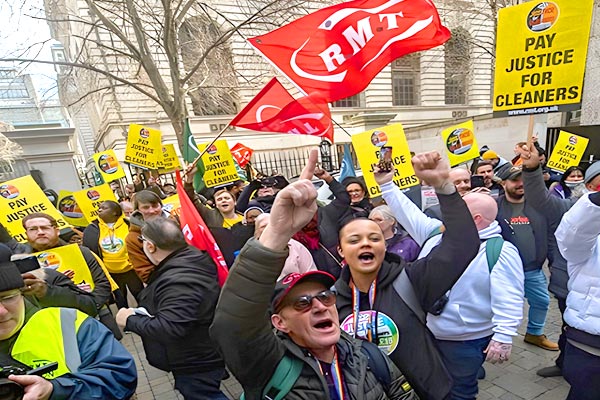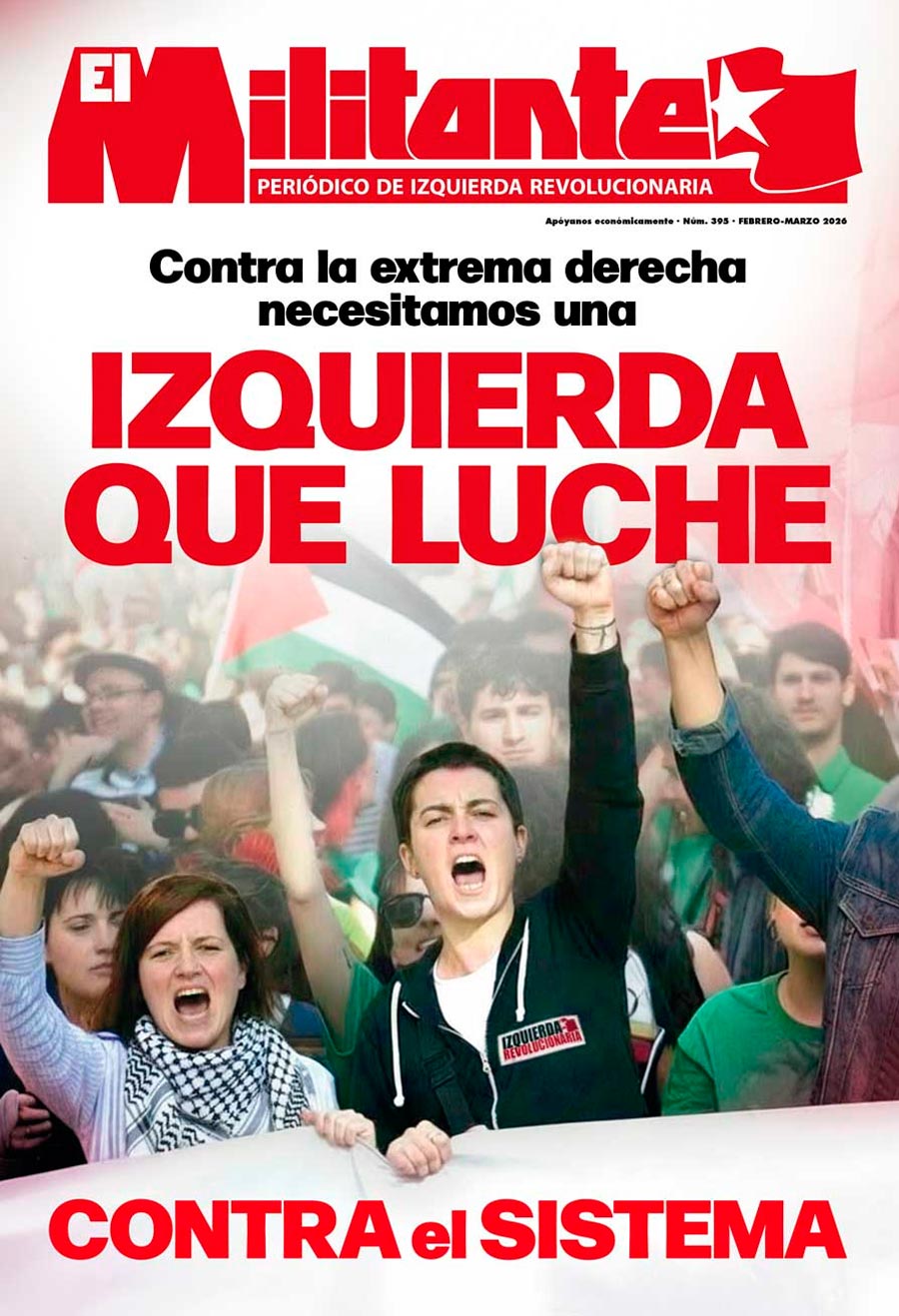The British working class is leading a labour and social uprising. Years of low wages and precariousness, of cuts and privatisations of the public services, working-class neighbourhoods and cities abandoned and left to rot, of imperialist adventures like the ones in Iraq and Ukraine, which have been paid for with the lives and social cuts on working class families, have engendered a deep discontent which is being turned into a generalised social rebellion.
Crisis and decay of British capitalism
The United Kingdom faces an unheard of environmental, social and economic catastrophe. Heatwaves which have paralysed the economy and led to thousands of deaths; an unprecedented drought that is forecast to last until October; inflation at 10.1% and which may reach 22% in 2023, condemning thousands of working-class families to misery, putting them in a position where they will have to choose between food and heating; Public services, especially the NHS, in the brink of collapse, and a horrendous recession looming over the horizon.
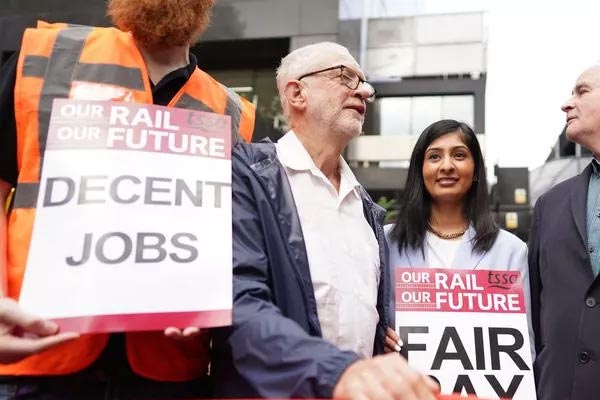
And in the midst of all, we witness the complete chaos of the ruling classes after the fall of Boris Johnson, whose pantomime nationalism has not been able to hide the complete failure of Brexit and the profound and irrevocable decay of what was oen of the foremost imperialist powers. An event that is also a severe blow for US imperialism, standing watch whilst its main ally in the Ukrainian war deals with problems which will have increasing unpredictable consequences.
A crisis which, as in 2008, will mean blood, sweat and tears for the workers in Britain but astronomical profits for the City, the banks and the big capitalist monopolies. The CEO’S of the biggest 100 British companies list in the London Exchange have seen their salaries increased by 39% in 2021. The Tory government pontificates that there is no resources for the NHS and other public services but, at the same time, channels thousands of millions of pounds to the war in Ukraine, lining the pockets of the military industry.
A strike wave that threatens to be turned into a social rebellion
Facing all this, the British working class has declared that “Enough is Enough”, with labour conflicts and strikes, wildcat and organised, spreading to the width and breadth of the isles. The refusal of the bosses to raise wages according to inflation, offering ridiculous increase of 4, 5 and at best 6%, which are a real-terms brutal cut, has unleashed the rage of the working-class.
These cuts are nothing new. According to Unite the Union, 1.3 million workers have experienced a real-terms pay cut of up to 25% in the last 12 years.
Last August, the railway workers lead by RMT have again paralysed the countries with a 3-day strike which has spread to the London Underground and the London buses. A strike which has brought the United Kingdom to a standstill and unleashed a campaign of fabrications and criminalisation by the Tories and the mainstream media owned by big capital.
Liz Truss, a reactionary epigon of Thatcher, given as favourite in the Conservative Party primaries (N.T.: she is now the prime minister), has barely drawn breath before accusing the British workers of being lazy, openly questioning the right to strike and threatening to toughen even more the anti-trade union laws, increasing from 40 to 50% the approval needed to legally call a strike and allowing the legal employment of strike breakers.
This is, in practice, supressing the right to strike, rowing rights back to “the Victorian Time”, as Mick Lynch, RMT’S general secretary, said.
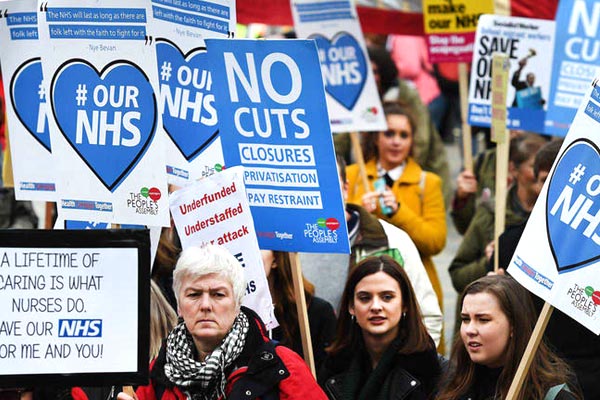
But all these threats are coming up empty. Every day, more sectors win strike ballots scheduled for the coming weeks, in what is becoming in practice a generalised rank and file mobilisation for a general strike: the Felixstowe dockers, where a third of UK import-exports pass through, which will be joined by Liverpool dockers; the 115 000 Royal Mail workers, university workers, firefighters, refusal and other council services workers; nurses and teachers and also barristers- who are in indefinite strike and journalists. The RMT general secretary has posed the possibility of an indefinite strike if no agreement is reached.
A strike wave that is spreading to workers not traditionally organised in trade unions, such as Amazon workers, or to companies where the unions have agree to ridiculous wage increases of 2/2.5%, and the shop floor overrules the union leadership. Spontaneous wildcat strikes who defy without fear the anti-trade union legislation created by Margaret Thatcher and expanded by successive governments.
In addtion, we have the fear of millions of British families not being able to afford heat for the winter due to the astronomical increase of energy prices- 110% increase in liquid fuels, 95% in gas and 54% in electricity- this will lead to some families having to choose between food or heating. It is expected that two thirds of British families- 45 million people- will fall in energetic poverty during January, and foodbanks have already warned that if donations do not increase they will have to reduce rations or refuse to serve 70% of people.
Keir Starmer and the labour leadership against the workers
The leaderless Tories are steeped into a profound crisis, probably the biggest one in their history. A crisis that would have already brought the government down and force new elections, if it was not for the class collaborationist and “social peace” policy of the Labour Party and its current leader Keir Starmer, as well as the TUC’s union bureaucracy.
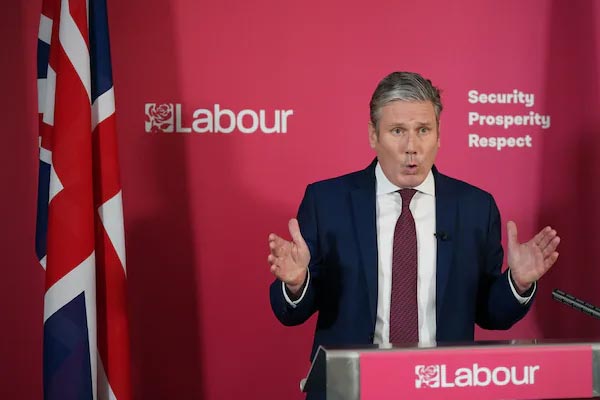
Keir Starmer is publicly opposing the strikes, forbidding the leaders, MPs and members to participate in the picket lines saying that : “The Labour Party in opposition should be the Labour Party in power…and a government does not join picket lines, it tries to solve conflicts.” A manifesto for a Keir Starmer government: if they are in power, the will be doing the bidding of the bosses and capitalists.
Despite this, various public office holders like Andy Burnham, the current mayor of Greater Manchester, Labour MPs and members have rebelled against this clearly strikebreaking and pro-bosses position, due to the enormous pressure of the class struggle. In fact, one of the main spokespersons of Starmer’s team- Sam Tarry, shadow minister for transport, was fired because he joined an RMT picket line during the July strike.
Fresh evidence, to add to the witch hunt against Corbyn which ended with his withdrawal for the Labour whip, of how impossible it is to conciliate the interests of the working-class with a labour leadership completely committed to the management of the interests of British capitalism. You are either with the working-class or with the bosses!
Starmer’s position is creating a serious conflict with the unions, especially the ones still affiliated to the Labour Party. Sharon Graham, Unite the union General Secretary, the second biggest union in the UK and the biggest union contributor to the Labour Party has already threaten to leave the Labour Party. She has accused it of becoming “irrelevant to the workers” and that under Starmers’ leadership it has become an obstacle for the workers when they decide to strike.
Adding insult to injury, Starmer and the current Labour leadership have, like good lapdogs of capitalism and their fifth column in the workers’ movement, erased any references to the nationalisations reintroduced by Corbyn in the party manifesto, at a time when more than 65% of the population supports the nationalisation of energy, water, transport and postal companies.
The conditions are mature for the TUC to call for a general strike
Workers in struggle are showing extraordinary strength, in spite of the attacks by the Conservative Party and the current Labour leadership, as well as the campaigns of lies perpetrated by the bourgeois media. They count with the support of the majority of the population, who feels in their flesh the consequences of relentless poverty.
Instead of writing begging letters addressed to the bosses and the Tories to join them in the negotiating table, as done in July, or launching ineffective campaigns for a £15 minimum wages whilst they in practice refuse to support the strikes, the leadership of the TUC and the main unions should call for a general strike.
Millions in the streets paralysing the economic activity of the country would be a demolishing attack against the bosses and would deal the death-blow to an ailing tory government.
The pressure is such that the debate about a general strike has become a reality, even featuring in the mainstream media. Unite the union has posed the possibility of presenting a motion to the TUC conference demanding it to “promote and facilitate the industrial coordination between unions to allow workers in struggle to win”.
The General Secretary of RMT, representing workers who have become the vanguard and reference of the growing strike wave, has joined the call, but saying that it should happen only if the Tories carry through their attacks against the right to strike and saying that the final word lies with the TUC.
The combative unions like RMT, the left in Labour, Corbyn, Momentum and the new platform “Enough is Enough”, which has been started by the aforementioned sectors and which has already garnered half a million people, as well as all the organisations that proclaimed themselves as Marxists and revolutionary, should immediately lead a militant campaign to demand the TUC to call for an immediate general strike.
A general strike that links and unites all the conflicts and struggles that spread and multiply day after day, built by and from the rank and file through strike committees in all the sectors and workplaces A general strike that coordinates with the civil disobedience movements that are emerging such as Don’t Pay UK. A general strike movement that armd itself with a socialist and revolutionary program calling for the expropriation of the banks and the big monopolies in the UK, in order to redirect their resources to guarantee decent wages, public housing, health and education and for no one to have to decide between food or heat.
It is time to go from words to actions, to learn from the errors of the Corbyn experience, namely when all efforts where channelled to institutional and parliamentary actions and the militant struggle in the streets and workplaces, as well as inside the unions and the TUC, was abandoned.
There is strength to bring down the Conservative Party and to expel from the unions all the corrupted leaders who have renounced to defend the working class and the oppressed.
But for this, we need to build a Marxist, internationalist revolutionary left that connects with the masses and defends the programme of socialism.
The British working class is not alone. It can rely in the support and solidarity of the rest of the European working-class, who faces a similarly catastrophic situation. There is no kind-hearted capitalism. The only way is to raise the flag of revolutionary and internationalist socialism!
[2] Food banks warn surge in demand will prevent feeding hungriest this winter
[3] The Community Charge, also known as poll tax, was a tax that forced every citizen to pay the same fee, independently of their income or any other social or economic circumstances- mainly affecting the working-class and the impoverished layers of society. Militant lead a civil disobedience campaign to refuse payment to which millions of people joine. In the end, both the campaign and the hundreds of massive and combative demonstrations lead to the withdrawal of the poll tax and the fall of Margaret Thatcher.
[4] The metropolitan area of Manchester, comprising city and suburbs with a population of 3 million people.
[5] In the case of water supply. Privatised by Thatcher in 1989, to the seriousness of the drought has been compounded by completely degraded infrastructures due to the lack of investment by the private companies, which leads to the loss of at least a fifth of the water due to leaks and breakages. The same can be said of the railways. This privatisations were never reversed, only advance, in the Labour Party governments of Blair and Brown.
[6] New poll: Public strongly backing public ownership of energy and key utilities






